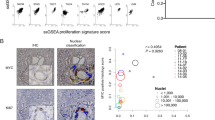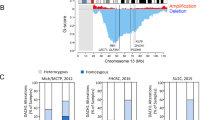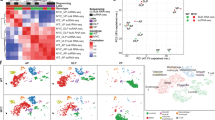Abstract
The genomic DNA profiles of prostate cancers with aggressive features were compared to the profiles of matched normal DNA to identify genes that are selectively amplified in the cancer cells. One of the identified genes, MCM7, which is a component of the DNA replication licensing complex, has been studied extensively both at the DNA and protein levels in human prostate tissues. Approximately half of the prostate cancer specimens studied showed MCM7 gene amplification, and 60% of the aggressive prostate cancer specimens had increased MCM7 protein expression. Amplification or overexpression of MCM7 was significantly associated with relapse, local invasion and a worse tumor grade. Constitutive expression of MCM7 in a human prostate cancer cell line, DU145, resulted in markedly increased DNA synthesis and cell proliferation compared to vector-only controls, and an increased cell invasion in vitro. Indeed, MCM7 overexpression produced primary tumors 12 times larger than vector-only controls and resulted in a rapid demise of mice bearing those tumors. These studies implicate MCM7, and the DNA replication licensing gene family, in prostate cancer progression, growth and invasion.
This is a preview of subscription content, access via your institution
Access options
Subscribe to this journal
Receive 50 print issues and online access
$259.00 per year
only $5.18 per issue
Buy this article
- Purchase on Springer Link
- Instant access to full article PDF
Prices may be subject to local taxes which are calculated during checkout



Similar content being viewed by others
References
Aparicio OM, Weinstein DM, Bell SP . (1997). Cell 91: 59–69.
Blow JJ, Hodgson B . (2002). Trends Cell Biol. 12: 72–78.
Brake T, Connor JP, Petereit DG, Lambert PF . (2003). Cancer Res. 63: 8173–8180.
Clark J, Edwards S, Feber A, Flohr P, John M, Giddings I et al. (2003). Oncogene 22: 1247–1252.
Cromer A, Carles A, Millon R, Ganguli G, Chalmel F, Lemaire F et al. (2004). Oncogene 23: 2484–2498.
Dumur CI, Dechsukhum C, Ware JL, Cofield SS, Best AM, Wilkinson DS et al. (2003). Genomics 81: 260–269.
Edwards MC, Tutter AV, Cvetic C, Gilbert CH, Prokhorova TA, Walter JC . (2002). J. Biol. Chem. 277: 33049–33057.
Fujita M, Yamada C, Goto H, Yokoyama N, Kuzushima K, Inagaki M et al. (1999). J. Biol. Chem. 274: 25927–25932.
Ishimi Y . (1997). J. Biol. Chem. 272: 24508–24513.
Jemal A, Murray T, Ward E, Samuels A, Tiwari RC, Ghafoor A et al. (2005). CA Cancer J. Clin. 55: 10–30.
Jiang W, McDonald D, Hope TJ, Hunter T . (1999). EMBO J. 18: 5703–5713.
Jing L, Liu L, Yu YP, Dhir R, Acquafondada M, Landsittel D et al. (2004). Am. J. Pathol. 164: 1799–1806.
Kukimoto I, Aihara S, Yoshiike K, Kanda T . (1998). Biochem. Biophys. Res. Commun. 249: 258–262.
Labib K, Kearsey SE, Diffley JF . (2001). Mol. Biol. Cell 12: 3658–3667.
Laitinen S, Karhu R, Sawyers CL, Vessella RL, Visakorpi T . (2002). Genes Chromosomes Cancer 35: 66–73.
Lu ZH, Xu H, Leno GH . (1999). Mol. Biol. Cell 10: 4091–4106.
Luo JH, Yu YP . (2003). Expert Rev. Mol. Med. 2003: 1–26.
Pacek M, Walter JC . (2004). EMBO J. 23: 3667–3676.
Padmanabhan V, Callas P, Philips G, Trainer TD, Beatty BG . (2004). J. Clin. Pathol. 57: 1057–1062.
Paris PL, Albertson DG, Alers JC, Andaya A, Carroll P, Fridlyand J et al. (2003). Am. J. Pathol. 162: 763–770.
Pasion SG, Forsburg SL . (1999). Mol. Biol. Cell 10: 4043–4057.
Romanowski P, Madine MA, Laskey RA . (1996). Proc. Natl. Acad. Sci. USA 93: 10189–10194.
Wolter H, Trijic D, Gottfried HW, Mattfeldt T . (2002). Eur. Urol. 41: 328–334.
Xue WC, Khoo US, Ngan HY, Chan KY, Chia PM, Tsao SW et al. (2003). Histopathology 43: 485–490.
Yoshida K, Inoue I . (2003). FEBS Lett. 553: 213–217.
Acknowledgements
We thank Chris Szakulski for manuscript preparation. This work is supported by grants from National Cancer Institute to GM (1UO1CA88110-01) and to JHL (R01 CA098249), and John Rangos Foundation for Enhancement of Research in Pathology.
Author information
Authors and Affiliations
Corresponding author
Rights and permissions
About this article
Cite this article
Ren, B., Yu, G., Tseng, G. et al. MCM7 amplification and overexpression are associated with prostate cancer progression. Oncogene 25, 1090–1098 (2006). https://doi.org/10.1038/sj.onc.1209134
Received:
Revised:
Accepted:
Published:
Issue Date:
DOI: https://doi.org/10.1038/sj.onc.1209134
Keywords
This article is cited by
-
Thorough statistical analyses of breast cancer co-methylation patterns
BMC Genomic Data (2022)
-
A phylogenetically-restricted essential cell cycle progression factor in the human pathogen Candida albicans
Nature Communications (2022)
-
Oxidative stress-induced circKIF18A downregulation impairs MCM7-mediated anti-senescence in intervertebral disc degeneration
Experimental & Molecular Medicine (2022)
-
Bioinformatics approaches identified dasatinib and bortezomib inhibit the activity of MCM7 protein as a potential treatment against human cancer
Scientific Reports (2022)
-
Transcriptional expression and prognostic roles of MCM7 in human bladder, breast, and lung cancers: a multi-omics analysis
Network Modeling Analysis in Health Informatics and Bioinformatics (2022)



